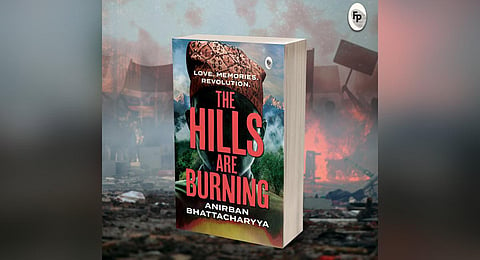

The Hills Are Burning is an autobiographical novel in which actor, producer and author
Anirban Bhattacharyya recollects his growing up years in West Bengal’s Kalimpong. Set in the late 1980s, one of the most violent periods in the region’s history, it is a coming-of-age story of a teenaged-boy in the backdrop of the Gorkha National Liberation Front protest and its subsequent silencing by the then CPI(M) government, resulting in atrocities being inflicted upon the locals.
At the centre is Tithankar aka Tukai, who is, to his displeasure, forced to shift base from the happening city of Calcutta to the quaint Kalimpong, when his father Shibshankar Chatterjee, a bank employee, is transferred to another branch. The hills, however, were anything but quiet. With the movement demanding a separate land for the Nepali-speaking Indians refusing to ebb, their new life is mired in uncertainty, and the book follows how years of violence impacted Tukai’s outlook on life and his relationships.
As the novel progresses, the boy’s formative years are vividly brought to life. Episodes of group-ism and bullying in a new school, teenage fantasies, new friendships are recollected in brilliant detail.
The most striking tale, however, is how the boy’s love story with Aditi, a Gurung girl, is tragically cut short after her conservative father discovers their relationship. Because of the local politics,
Aditi’s father didn’t want her to date a Bengali boy.
A large part of the book is dedicated towards recreating Bengali sentiments. It talks about the community’s lifestyle, its prejudices and how it is stereotyped. The story is also about Kalimpong and its culture. It is commendable how the novel manages to develop narratives of love, loss, longings, and memories against the volatile backdrop of an agitation.
The fluid language enables it to be read in a single sitting, despite the fact that it is 400-page long. Ironically though, the story seems to lack depth in places. Bhattacharyya should have dug a little deeper while describing the emotional contours of his characters. For instance, when Aditi’s mother, Bhavna, consoles her after the break-up, her own tragic love life, which the author only brushes past, would have made for solid context to the inter-community politics. Another place where the book falters is the sketchy details about the foundation of Tukai’s friendships with Norong and Rupesh. Although it claims to
be about three friends, it is a dynamic that the author does not seem to have invested in much.
Nevertheless, The Hills are Burning is a fantastic book. It is sensitive, informative, and entertaining, and contains all the elements to be an action-packed, unputdownable tale. With the focus being nostalgia, it is relatable, even if you are not Bengali or have never visited Kalimpong.
The Hills are Burning
By: Anirban Bhattacharyya
Publisher: Fingerprint
Pages: 412
Price: Rs 399